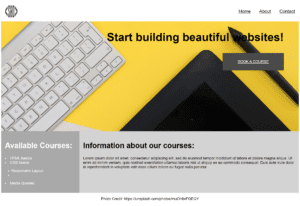When starting any web project, there are a lot of information that is required in order to “get things right”. Noroff presents a list of 10 questions (some of them contains more than one question, so it is actually a bigger list). Anyway, I have made my own. Both list are superficial. This is especially true for the questions regarding users, but it is a good starting point to the subject.
The “ideal” list is a mix of my questions and a few from Noroff’s list., marked in bold. Some of the questions are overlapping. These are marked as strike-through in the Noroff List.
| Noroff List | My list |
|---|---|
| What does your business do? | |
| Who are your competitors (and how do you differ from them)? | |
| Why do you need a website? | |
| Who is interested in your product or services? | |
| For your primary target group, what is the most important product or service? | |
| Which task should your users be able to solve on your site? | |
| Name 3 sites you like and why? | Are there a visual profile that describes how your business should communicate? If not, are you planning on developing one? |
| Who is the contact person for this project? | How are you planning to address maintenance and website updating? |
| What is your MVP? | |
| What is the project time line horisont | |
| What is the project budget | |
| How will your website relate to all other touchpoints your business have | |
| Do you have content, as in images, text, graphics and video or is this developed during the project? If so, who will develop this? | |
| Does your website need to collect information about your visitor? If so, have you addressed how to comply to GDPR regulations? | |
| Is there a live website that needs to be kept active while the new website is developed? Where will this new site be installed? |
A compiled list of questions are like this
What does your business do? To understand the business, it is important to understand what product or services they offer to their customers. How do they see themselves and their business
Who are your competitors (and how do you differ from them)? To know who their competitors are is important to see what landscape they operate in. Is there a certain look'n feel for this area, how are the competitors presenting their services or products. What is the business' unique selling pointWhy do you need a website? You might think this is a stupid question, but you’d be surprised on how often a business doesn’t know what they want to achieve with a website. They don’t know who to serve or what to provide for them
Who is interested in your product or services? This question is to address the target group so that I can develop a persona. It is easier to talk about features and functionality if you can ask “will Paula like this” instead of “will our users like this”. The most important statement in this matter is “You are not your users”, so our personal preferences have to be set aside.
For your primary persona, what is the most important product or service? A website cannot serve everybody, and some people are more important than others – then ones that uses the website the most and/or leaves the most revenue. A website should primarily serve these users with their most used feature, and secondary the rest
Which task should your users be able to solve on your site? Common tasks are buying prouducts or services, contact the business, find information about a product or service, find the location of a business
Name sites you like and why? Their personal preferences can be used as a starting point for inpiration.
Are there a visual profile that describes how your business should communicate? If not, are you planning on developing one? It is so much easier to develop a site if visual guidelines exsists. If they don’t, the colour and typography choices are limitless and falls down to user preferences. If the client does not like the colours I have picked, there are 16 million more to choose from – and we cannot try them all. The same applies to fonts – here Google alone provides almost 9000 of them.
How are you planning to address maintenance and website updating? A website requires maintainence after it is “finished”. Do they have personell to address this or do they need my mainainance service plans.
What is your MVP? A MVP is the minimal amount of work that has to be put into the website before it can be launced. A website is never finished, so “website finished” is not a good time for launching the site (then it will never go live). Often this MVP is “when the site has the same amount of content as our current website”.
What is the project time line horisont? Do you have personell to handle this schedule? Many business owners want a new website tomorrow (or yesterday), but they don’t allocate resources in their business to achieve this. If they don’t, the site will not be launched in time.
What is the project budget? Any project can be solved in different ways with a different cost. Think of it as being thirsty. The cheapest solution is to give you a glass of water. The most expensive is to build you a well so that you can drink whenever you are thirsty. If the budget is small, the website should be built with existing code. While doing so, the requirements may have to adjust to what existing code can provide. Custom coding is expensive. Integration is another feature that drives the cost.
How will your website relate to all other touchpoints your business have? A business have many different touchpoints, such as social media channels, print designs, signs, letters etc. The look and feel of all of them should be the same. The tone of voice (how they communicate their personality) should be the same. A website does not exist in a vakuum.
Do you have content, as in images, text, graphics and video or is this developed during the project? If not, who will create this? A common issue I see while working with clients is the lack of quality content to publish. Some of them don’t have imagery, while others only have superfichial texts that does not serve their purpose
Does your website need to collect information about your visitor? If so, have you addressed how to comply to GDPR regulations? GDPR is to protect EU/EØS citicens agains the collection and sharing of personal information on order to exploit this info for marketing or other purposes. If you collect personal information (name, email, address, credit card info, and even IP addresses) you need to address GDPR regulation. GDPR does not only apply to websites, but to every digital or analogue system that collects information about your users/clients/customers etc.
Is there a live website that needs to be kept active while the new website is developed? Where will this new site be installed? Often, I need to install a staging site in the project period, so that the client can work on this while keeping their existing website live. When the project is done, I either move the website to a new location or update the pointers for the domain name
Who is the contact person for this project? Will this person be available during the project? One contact person is imprtant because if you communicate with several, you might end up getting mixed messages and you don’t know which requirements are valid and which are not.



